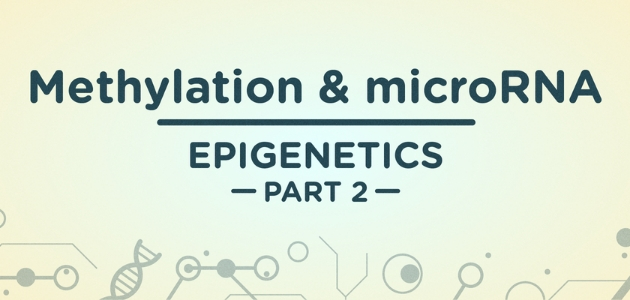Methylation and microRNA | Epigenetics Part 2
Epigenetic modifications are changes to the genome that do not change the DNA sequence. Methylation and microRNA are two processes that influence epigenetics in the body.
During the methylation process, methyl groups are attached or removed from genes, resulting in hypermethylation or hypomethylation, respectively. This affects how the body reads the DNA sequence- either turning on or off specific genes. Hypermethylation can result in tightly wound DNA, meaning the machinery that reads the genome skips over it as it is not accessible. On the other end of the spectrum, hypomethylation results in the unspooling of DNA, making it easier for cellular machinery to read, transcribe, and translate the gene. In the case of tumor suppressor genes, environmental toxins such as cigarette smoke can turn them off, potentially increasing the ability of tumors to form.
MicroRNA, or miRNA, is a short amino acid sequence that can alter the expression of genes that synthesize proteins. These proteins are important for cellular health due to their role in supporting normal metabolic functions. There are thousands of miRNAs that are currently being studied for their role in a variety of conditions. Supplementation with specialized protein extracts can introduce miRNAs into the body including miRNA-188, miRNA-155, miRNA-208, and miRNA-218 which influence gene expression and protein synthesis to help resolve inflammation.
Environmental factors are a major regulator of epigenetic changes, especially diet. Whole food nutrition can harness both methylation and microRNAs to influence genetic expression and improve general health and wellbeing. For example, phytonutrients and vitamins in beets introduce methylation tags that help lower homocysteine in the blood and promote heart health.
If you haven’t yet seen it, be sure to watch Epigenetics Part 1.




